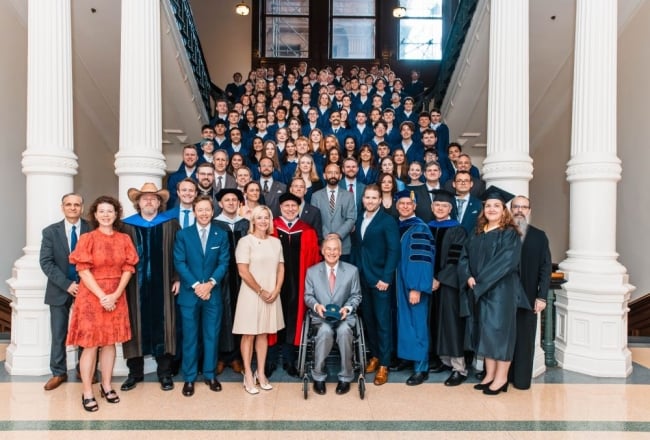You have /5 articles left.
Sign up for a free account or log in.

First year-students and staff at University of Austin meet with Texas governor Greg Abbott (center).
University of Austin
University of Austin, a new higher ed institution founded by high-profile conservative figures, officially welcomed its inaugural class on Monday.
The university, sometimes referred to as UATX, markets itself as an institution born out of alarm over the “rising tide of illiberalism and censoriousness prevalent in America’s universities” and says it is committed to “the pursuit of truth.”
In his speech at convocation, President Pano Kanelos, who formerly served as president of St. John’s College, described the university’s 92-student cohort as “pioneers.”
“As I look across this room, I do not see students or faculty or staff or loved ones,” Kanelos said. “I see a room filled with the courageous, the bold, with pioneers, with heroes. I see a room filled with those who have said, emphatically, ‘We will not accept passively what we have been handed, the givens are not good enough, we will create anew.’”
“We have come together, all of us, as founders,” he added.
Provost Jacob Howland told students in his opening remarks that launching the university involved trekking through “rough terrain.”
“In under three years, we have built a rough-hewn yet sturdy and serviceable outpost of real education,” Howland said.
The university is not accredited but received approval from the state of Texas to grant degrees, which allowed it to begin accepting applications last November. Students can earn a bachelor’s degree in liberal studies with a concentration in one of the fields offered by the university’s “centers of academic inquiry,” which include STEM, arts and letters, and economics, politics and history. The university currently employs about 20 faculty members, with no tenure system. Tuition is $32,000 per year.
On convocation day, students met with Governor Greg Abbott at the Texas state capitol. Then, in a hotel ballroom near campus, students decked out in dark-blue robes each signed the register to officially enroll, receiving a copy of The Odyssey, Kanelos told Inside Higher Ed. He said the incoming class comes from at least two dozen states. And some of the students are familiar faces from high school programs UATX ran in various cities—including Austin, Los Angeles, Denver, Miami and Washington—before the university’s launch, according to the website.
“It really suddenly felt like, wow, we’re a university now,” Kanelos said.
The fledgling institution sparked controversy when it was first announced three years ago on the Substack of conservative writer Bari Weiss, who now serves as a member of the Board of Trustees.
The university’s Board of Advisors includes prominent names including Larry Summers, president emeritus of Harvard University; West Virginia University president E. Gordon Gee; and evolutionary biologist Richard Dawkins. It also includes some controversial figures, such as Dorian Abbot, a University of Chicago geophysics professor known for his outspoken criticism of diversity, equity and inclusion; Joshua Katz, who was fired from Princeton University over a relationship with a student; and Ayaan Hirsi Ali, a research fellow at the Hoover Institution, a conservative think tank at Stanford University, who has asserted that Islam is incompatible with Western, democratic ideals.
The Root mocked the university as “Hogwarts for Wypipo” and dubbed it “anti-woke.” Some academics have blasted UATX for judging the rest of higher ed too harshly; University of Chicago chancellor Robert J. Zimmer, who left the advisory board, wrote in a statement that while he admired the “new organization’s commitment to a liberal arts education and free expression,” he viewed the founders’ statements on higher ed as “largely quite critical” and said they “diverged very significantly” from his own. Similarly, Wesleyan University president Michael S. Roth wrote in Politico that the University of Austin raised some legitimate concerns but also made a name for itself by “attacking” other institutions for “being too tied to the elite liberal consensus,” dismissing the internal grappling and pursuit of diversity that much of the sector aspires to.
“We’ve heard such complaints again and again from moderate and conservative critics at odds with students and faculty devoted to such things as rooting out racism, treating less conventional people with respect and eradicating gender-based violence and discrimination,” Roth wrote.
Kanelos believes all the media attention helped the university to recruit students. He said that the day the university opened applications, at least 100 students submitted them. He described the inaugural class as a “politically heterogeneous group” demonstrating a “a hunger to throw around ideas and interest in hearing what other people had to say.”
“When politics come up, you hear not just two sides, but like five sides to everything,” he said.
Weiss and others celebrated the university’s first convocation on X.
She wrote that the university began as “an idea” tossed around by herself and a few others: Kanelos; entrepreneur and co-founder of Palantir Technologies Joe Lonsdale, now the university’s board chairman; and Niall Ferguson, Milbank Family Senior Fellow at the Hoover Institution.
“Today in Austin it becomes a reality,” she posted. “Welcome to the class of 2028.”





